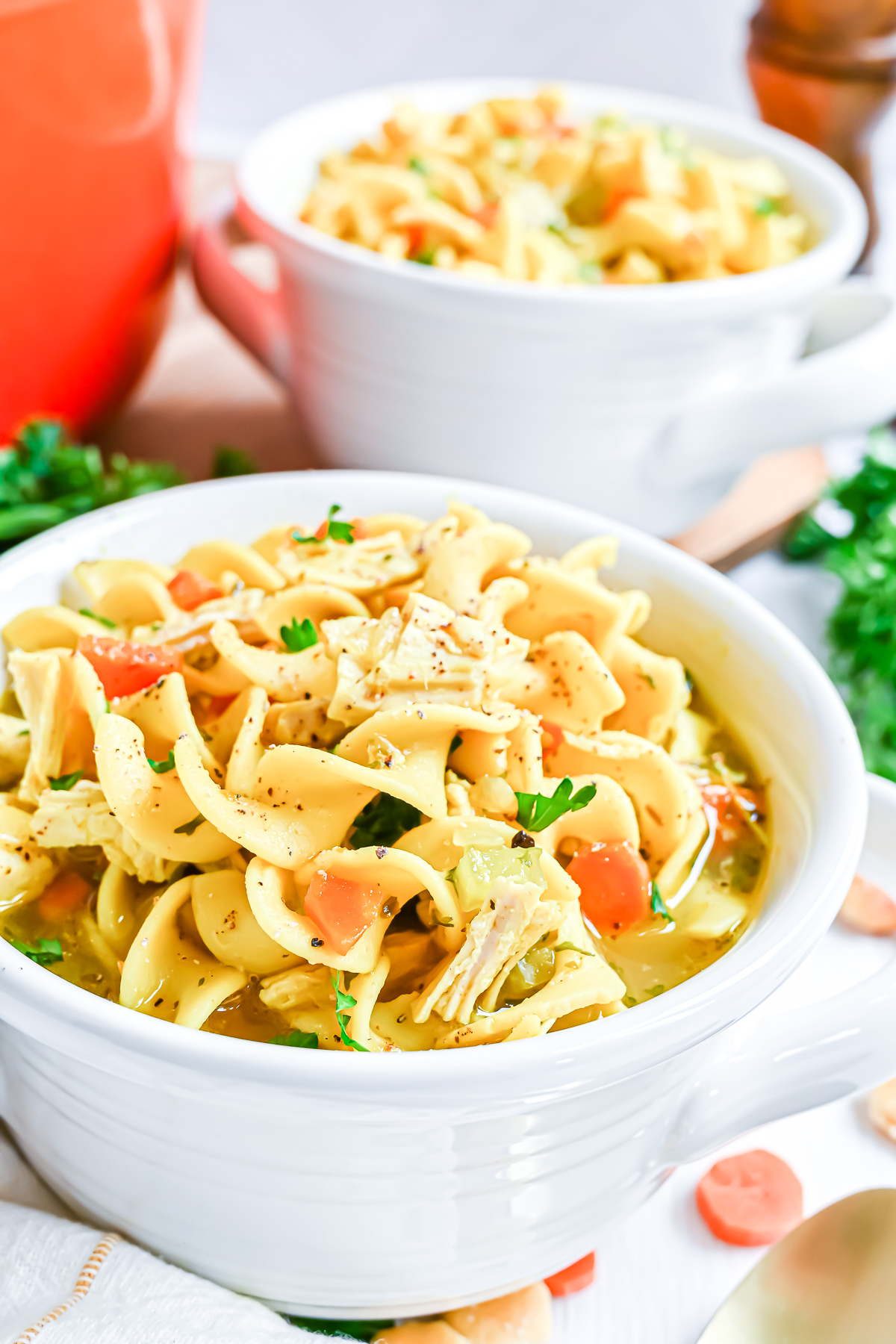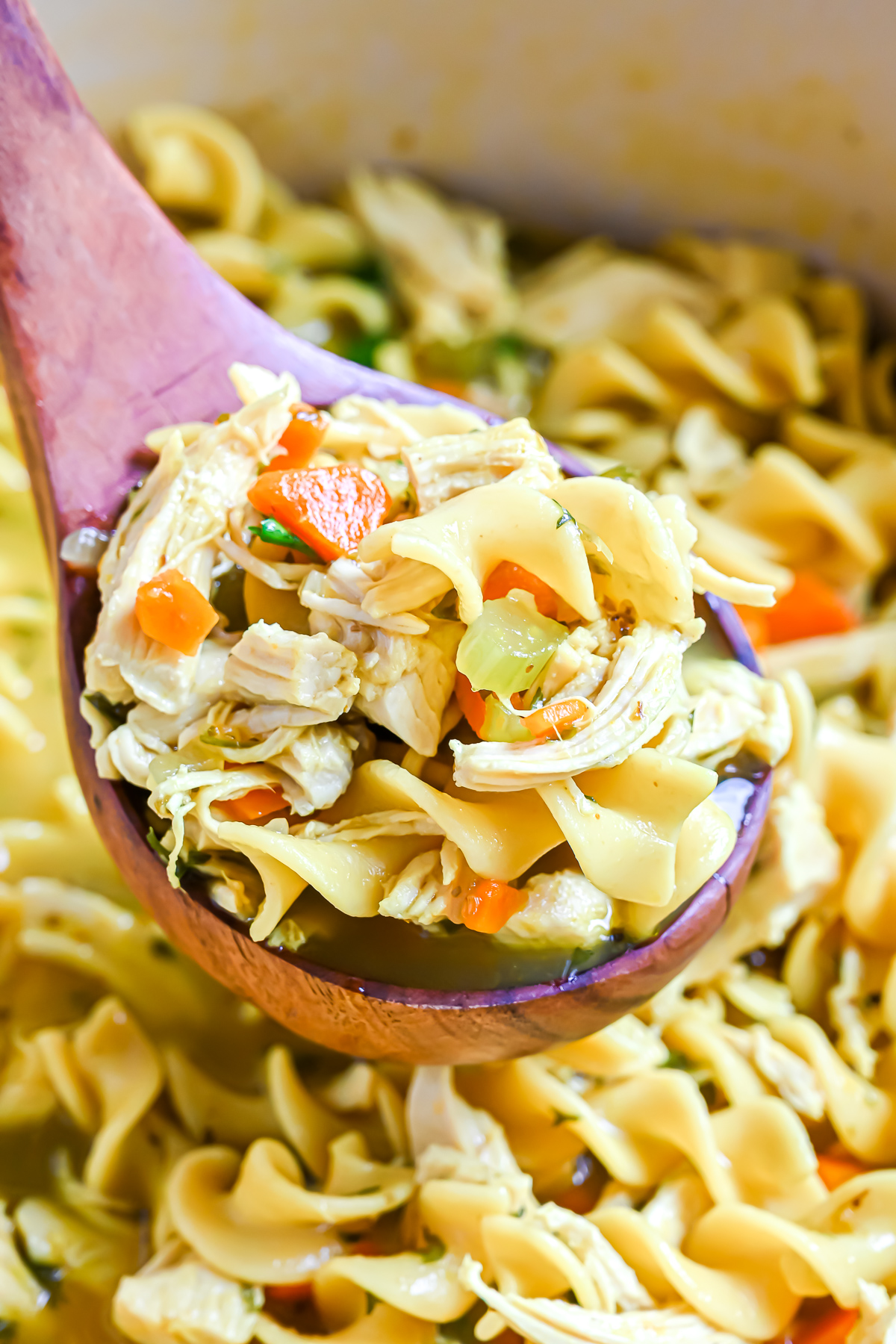There's nothing quite like a comforting bowl of homemade chicken noodle soup on cold winter days. But what happens when you've made a big pot of soup and have leftovers? How long does chicken noodle soup last in the refrigerator?

In this post, I will cover all the essential information for maintaining the best quality and ensuring safe food storage for leftover chicken noodle soup.
But before you read on, I've got to tell you that my favorite chicken noodle soup recipe of all time is my Copycat Panera Chicken Noodle Soup. Don't get me wrong, Crockpot Loaded Baked Potato Soup and Authentic Pasta Fagioli top my list of delicious soup recipes. But there's just something about a good, old-fashioned chicken soup topped with my Seasoned Soup Crackers.
And by the way, if you plan to make homemade chicken noodle, skip the store-bought stock and follow my recipe for Chicken Stock From Rotisserie Chicken. My favorite thing about this recipe is that it's a great way to use all the chicken meat to make a hearty soup and get homemade stock.

The Shelf Life of Chicken Noodle Soup
Generally, homemade soup lasts 3-4 days in the refrigerator when stored properly. This guideline applies to all types of soup, whether you've used chicken thighs, whole chicken, or even rotisserie chicken for that rich, hearty flavor. Several factors, including the storage conditions and ingredients used, determine the shelf life of chicken noodle soup.
Best Practices for Storing Homemade Chicken Noodle Soup
To ensure your homemade chicken noodle soup remains safe to eat and retains its best quality, follow these simple steps:
- Cool the Soup Completely. After cooking, let your soup cool to room temperature before transferring it to the refrigerator. Be sure to do this within two hours of cooking to minimize the risk of food poisoning. You can speed up the cooling process by transferring the soup to smaller, shallow containers.
- Avoid Hot Storage. Never put hot soup directly in the fridge, as it can raise the temperature and potentially spoil other foods.
- Airtight Containers. Use airtight containers to prevent moisture and air from getting in, which can cause the soup to spoil faster. - **Material:** Glass or BPA-free plastic containers are ideal. Avoid storing soup in metal containers, as they can affect the flavor over time.
- Date the Container. Label your container with the date you made the soup. Homemade chicken noodle soup typically lasts 3 to 4 days in the refrigerator, so it's essential to keep track.
- Refrigerator Temperature. Make sure your refrigerator is set to 40°F (4°C) or below. This optimal temperature slows down the growth of bacteria, keeping your soup safe to eat for longer.
- Avoid Contamination. Always use clean utensils when serving or handling the soup to avoid introducing bacteria. Avoid tasting the soup directly from the storage container to prevent contamination.
- Reheat Safely. Bring the soup to a simmer over medium heat to ensure it's heated evenly when reheating. This is especially important for creamy soups or soups with egg noodles that might have absorbed a lot of liquid.

Signs of Spoilage
A few days after making that bowl of soup, you should check for signs of spoilage.
- Sour Smell or Off-Odor. One of the first signs of spoilage is an unusual, sour, or unpleasant smell. If your chicken noodle soup smells off in any way, it's best to discard it.
- Appearance Changes. If the broth looks cloudy, has changed color (e.g., darker or greenish), or has a strange film on the surface, it could indicate bacterial growth. Visible mold on the surface or around the edges of the container is a clear sign of spoilage. Even if mold appears in only one part, the entire soup should be thrown out.
- Texture Changes. If the noodles, chicken, or broth feel slimy or sticky, this strongly indicates that the soup is no longer safe to eat. While some separation of broth and ingredients can be normal, excessive or unusual separation can indicate spoilage.
- Unusual Taste. If the soup tastes sour, bitter, or simply not how it should, it's a sign that it has spoiled. Always taste cautiously if you're unsure about the soup's freshness.
How Different Types of Noodles and Ingredients Affect Soup Storage
The type of noodles and ingredients used in homemade chicken soup can significantly impact its shelf life and freezing methods. For example:
- Egg Noodles. These tend to absorb more liquid, becoming mushy when reheated after freezing. If you plan to freeze the soup, consider cooking the egg noodles separately and adding them fresh before serving for the best quality.
- Hearty Ingredients. Using ingredients like whole chicken, chicken thighs, or homemade chicken stock generally holds up better during freezing than creamy soups or milk-based soups, which can separate upon reheating.
- Fresh Herbs and Vegetables. While adding a burst of flavor, these can lose their texture over time, especially when frozen. For best results, add fresh herbs after reheating the soup.

Freezing Chicken Noodle Soup
If you've made a large batch of soup and don't plan to eat it all within a few days, freezing is an excellent option. Freezing soup can extend its shelf life to a large extent. When freezing, use heavy-duty freezer bags or freezer-safe containers to prevent freezer burn and maintain the soup's best quality.
- Before freezing, ensure the soup cools completely. Similar to when you're going to store it in the refrigerator, cool it to room temperature before transferring it into a container for freezing.
- Use the Right Containers. An airtight container is ideal for storing leftover soup. For larger batches, a freezer-safe container or heavy-duty freezer bag is a great way to store soup for later use. Be sure to leave some space at the top of the container to allow for expansion if freezing, and label the container with the date.
- For the best safety, consume frozen soup within 2-3 months for the best flavor and texture.
What About Canned Soup?
When it comes to canned chicken noodle soup, the storage principles differ slightly from homemade versions. Canned soup typically has a long shelf life due to its airtight seal and preservatives.
An unopened can of chicken noodle soup can last for years in a dry place. There is usually a best-by date stamped on the bottom of the can. Once opened, transfer any leftover soup to an airtight container and refrigerate it, where it will last for 3-4 days.
Unlike homemade soup, canned soup's texture and flavor usually hold up better in the fridge, but freezing isn't typically recommended as it can affect the soup's consistency.
Understanding how long homemade chicken noodle soup lasts in the refrigerator is key to enjoying it safely. You can extend its freshness and flavor by using proper storage techniques like airtight containers and cooling the soup quickly.
Whether you're dealing with egg noodles, hearty vegetables, or creamy bases, following these guidelines ensures your favorite soup recipe remains a comforting and delicious option. For the best experience, consider freezing any leftovers and reheating them carefully to retain the soup's quality.






Leave a Reply